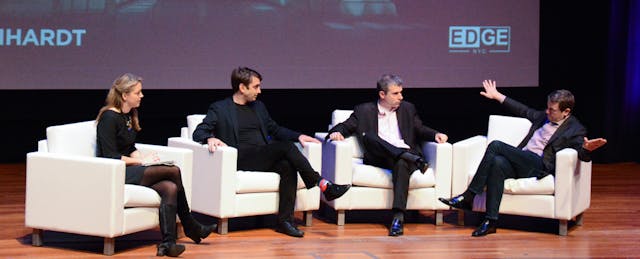Can a conference help make New York the world’s edtech capital, the way Basel, Hong Kong and Miami are synonymous with emerging art and London, Milan, New York and Paris are with fashion?
That’s Don Burton and Jonathan D. Harber’s ambition. The duo runs EDGE, a New York City-based education technology accelerator. They are also the organizers of National Education Week, an education conference that took place December 15th through 17th in downtown Manhattan.
National Education Week was first developed by the Maryland-based National Education Initiative, which put on the event in Washington, D.C. in 2013 and 2014. In October, EDGE took control of the event to serve several purposes. As Harber stated in his opening address, EDGE intended this year’s conference to be:
- a time to celebrate education innovators;
- a place to discuss education “problems and progress;”
- an avenue where socially responsible investors could find companies to fund;
- and a graduation ceremony for the 10 companies that recently completed EDGE’s three-month program.

On a grander scale, EDGE views National Education Week as part of its strategy to cultivate New York into a world-class edtech hub. The company wants the conference to be a “big, global convening of all the rising stars of edtech innovation,” similar to Art Basel’s annual fairs, Burton told EdSurge in an interview. He and Harber share the same vision: to grow the event into a Fashion Week-level phenomenon by encouraging others to hold edtech-related events in New York around the same time. “Just as Fashion Week is a real destination [for the fashion industry every year], we’d like to see National Education Week become the same, so everyone who’s passionate about education innovation will pounce on New York simultaneously,” Harber told EdSurge.
National Education Week isn’t attracting Fashion Week-size crowds yet. About 800 people—a mix of startup CEOs and founders, corporate representatives, investors, administrators, educators, students and policymakers—attended the conference, which was held on New York University’s campus. (NYU’s Steinhardt School of Culture, Education, and Human Development was an event co-host.)
The first full day of programming featured talks and panels on everything from the merits of learning and teaching coding (from venture capitalist Fred Wilson) to business opportunities in the Chinese education market (entrepreneur Chris Whittle) and methods for expanding educational opportunity (Teach For All’s Wendy Kopp). Presentations from EDGE’s inaugural cohort of companies capped off the day.
On the event’s second full day, participants listened to 35 pitches (mostly from non-EDGE startups) and attended “breakout panels” that delved into related topics (‘Career and corporate training in the age of millennials’, ‘Maker movement and STEM learning outside the classroom’) and fostered discussions. There was also a “global innovation gallery” where startups could demonstrate their products. The conference’s final activity was “Open Lab New York,” a set of free, education field trips to places such as the American Museum of Natural History and NYU’s tech-y Interactive Telecommunications Program (ITP) workshop.

It was a format geared largely to investors, rather than educators, though several high-profile administrators—including Richard Culatta, the outgoing director of the U.S. Department of Education’s Office of Educational Technology, New York City schools chancellor Carmen Farina; and United Federation of Teachers president Michael Mulgrew—presented and spoke on panels, as did some Columbia and NYU professors.
Burton says EDGE designed the conference to galvanize the entire edtech community, but angel and seed investors were its “primary audience.” The event’s tagline (“Endow the future, invest in edtech”) underscored this emphasis.
“We have investors here who want to support edtech, but feel they don’t have enough knowledge to do that,” Burton explains. “There are so many spaces in edtech…an investor might know the higher-ed content curriculum space, but nothing about tools and platforms for career and corporate education. This is a place where people can find out more about these different, diverse segments.” (EDGE also has an interest in matching startups with investors since it takes a 6% equity stake in the companies that go through its accelerator.)
National Education Week’s investor-centric approach meant that people with years of education experience—such as Kathy Benemann, CEO and founder of the product strategy firm, Kiyo and co-leader of the NYEdTech Meetup—found more value in the startup pitches than the talks and panel discussions. “I liked that the conference touched on every single edtech domain, but the panels seemed introductory to me and other edtech veterans present,” Benemann told EdSurge. She added, however, that she understood that covering the basics might have been necessary for attendees new to the industry.
In contrast, Benemann enjoyed the event’s dozens of startup pitches. “I felt the product ideas were compelling, the companies had conducted due diligence on their markets and they were talking about users’ real, core problems.”
Benemann also gave EDGE kudos for inviting companies from nine other accelerators, including Edtech Europe, Fresco Capital (Hong Kong/Japan), MaRS Discovery District (Canada) and MindCET (Israel) to pitch to the National Education Week audience. (The accelerators paid a fee for their startups to present and participate in the event’s demo gallery.) “I was curious whether the conference would be an EDGE promo-platform, but these companies and accelerators were from around the globe,” Benemann notes.
EDGE thinks this early-stage curation, along with its laser focus on New York, will differentiate National Education Week from other edtech conferences. Its closest competitor might be the ASU GSV Summit, an annual conference that EdSurge has called “a non-stop networking event” for edtech dealmakers.
Burton contends that National Education Week does a better job spotlighting global edtech talent than other events. “We find what is at the cutting edge of innovation and education and work with the right [partners] to bring those companies together,” he says. Harber believes National Education Week’s utilization of New York City resources, including Columbia and NYU’s research and teaching programs, sets it apart. “We’re really opening up New York as a learning lab,” he says.


